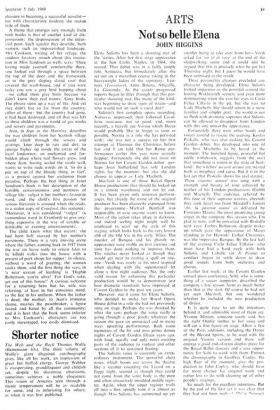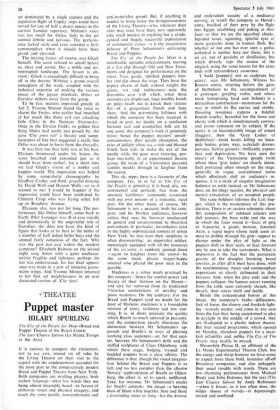ARTS Not so belle Elena
JOHN HIGGINS
Elena Suliotis has been a shooting star of the 'sixties. After her first stage appearance at the San Carlo, Naples, in 1964, she soared. That debut was in a fairly simple role, Santuzza, but immediately after she set out on a marathon course taking in the heavyweight ladies of the repertory: Leo- nora (Troratore), Anna Bolena, Abigaille, La Gioconda. As the career progressed reports began to filter through that this par- ticular shooting star, like many of the kind, was beginning to show signs of strain—and who would not on such a vocal diet?
Suliotis's first complete opera recording, Nabtteco, impressed; then followed Carat- leria ruslicana, not so good; and. more recently, a heavily cut Norma which Decca would probably like to forget as soon as possible. Norma is a role she has persisted with: she was not a success on her first attempt at Florence the Christmas before last and I am told that her Rome per- formances earlier this year were scarcely happier. Fortunately she did not insist on Norma for her Covent Garden debut--per- haps Joan Sutherland has sole London rights for the moment--but alas she did choose to appear as Lady Macbeth.
Macbeth is one of those Royal Opera House productions that should be locked up in a remote warehouse and not let out. It has been given only nineteen perform- ances, but already the name of the original producer has been discreetly expunged from the programme—Michael Benthall was responsible, in case anyone wants to know. Most of the action takes place in darkness. and indeed secling night might well be employed to scarf up the style of this staging, which looks back to the very lowest ebb of the Old Vic in the early 'fifties. The murder of Banquo and his ghostly re- appearance were risible on first viewing and time has done nothing to improve them. The witches never looked as though they would get near to casting a spell on any- one—Verdi was rarely at his most inspired when dealing with the supernatural—let alone a first night audience. No. the only valid reason for exhuming this particular production would be to demonstrate just how dramatic standards have improved at Covent Garden in the past ten years.
However, out it came for Elena Suliotis, who decided to make her Royal Opera House debut in a role she had not previously sung on stage. Perhaps she was shocked by what she saw; perhaps the voice really is going through a poor patch; whatever the reason she gave an unmusical and in many ways upsetting performance. Rack came memories of the hit and miss prima donna nights of Covent Garden fifteen years ago, with loud, squally and ugly notes exciting parts of the audience to rapture and other sections of it to sustained booing.
The Suliotis voice is currently an extra- ordinary instrument. The powerful chest notes. which boom out across the theatre like a steamer rounding the Lizard on a foggy night, seemed as though they could not come from the same body as the pure and often attractively moulded middle regis- ter. Again, when the upper register trails off into a fine, spindly tone it is almost as though Miss Suliotis has summoned up yet
another being to take over from her—Verdi asked for ',In fil di wee' at the end of the sleepwalking scene and it could just be argued that this is precisely what he got last Thursday night, but I guess he would have been surprised at the result.
These personality changes precluded any character being developed. Elena Suliotis looked imperious as she prowled around the louring Wakhevitch scenery and even more domineering when she cast her eyes at Carlo Felice Cillario in the pit, but she was no Lady Macbeth. She should return in a more familiar and simpler part: the world is not so flush with dramatic sopranos that Suliotis can be allowed to disappear from London with this one unworthy appearance.
Fortunately there were other hands and voices around to rescue the evening. Kostas Paskalis, who was also making his Covent Garden debut, has developed into one of the best Macbeths to be heard at the moment. The hunched figure, powerful but oddly withdrawn, suggests from the start that something is rotten in the state of Scot- land: the witches' accenti arrani are treated both as prophecy and curse. But it is in the last act that Paskalis shows his real stature: 'Pieta, aspen°. amore' was sung with a strength and beauty of tone achieved by neither of his London predecessors (Gobbi and Macneill. The audience, relieved by this time of their soprano worries, cheered; they took heart too from Macduff's lament 'AIL la paterna mono' as delivered by Ermanno Mauro, the most promising young singer in the company this season who. I'm glad to note, will be entrusted with Rodolfo next year. Forbes Robinson. despite make- up which gave the appearance of Moses standing in for Harrods' Father Christmas, was the impressive Banquo. By the last half of the evening Carlo Felice Cillario—who must have had a hard week with both Suliotis and Caballe (in II Pirata) to conduct— began to settle down to draw good sounds from both orchestra and chorus.
Earlier last week. at the Covent Garden annual press conference. Solti. who is some- thing of a soccer supporter, described the company's late season form as much better than that at the start. Of course he had not yet seen Macbeth, but one wondered whether he included the new production of Orfeo.
It is quite easy to see the intentions behind it. and admirable most of them are. Yvonne Minton, someone surely said, has the right Orphic timbre to her voice and will cut a fine figure on stage. Allow a few of the Paris additions, including the Dance of the Blessed Spirits, to be used with the original Vienna version and there will emerge a good end-of-term display piece for the Royal Ballet dancers and a rare oppor- tunity for Solti to work with them. Entrust. the choreography to Geoffrey Cauley, the high flyer of the moment; give the pro- duction to John Copley, who should have far more chance for original work and rather less to do with cleaning up of other people's stagings.
So much for the excellent intentions. Rut by the end of the first act it was clear that they had not been reali,-0 rahP:13 "rowse's
set dominated by a single cypress and the regulation flight of Copley steps could have served for any of half a dozen operas in the current London repertory. Minton's voice was too small for Orfeo. Solti in the pit seemed febrile and nervous. The perform- ance lacked scale and even sounded a little commonplace when it should have been grand and elevated.
The missing factor, of course, was Gluck himself. The score refused to unroll before us, clear and serene, like a noble and un- interrupted landscape. The lesson is ob- vious: Gluck is exceedingly difficult to bring off in the theatre. Without a grand overall conception of the work, coupled with the technical expertise of making the various pieces of the jigsaw interlock. Orfeo ed Euridice slithers away from the grasp.
To be fair, matters improved greatly in Act 2. Yvonne Minton found the voice to charm the Furies, who earlier had snatched at her much like those evil rats attacking little Clara in the Nureyev Nutcracker. Once in the Elysian Fields, so golden that King Midas had surely just passed by, she gave 'Che puro del' a beauty and sump- tuousness of line that suggested a really fine Orfeo was about to burst from the chrysalis.
It was here too that Solti was at his best. Elysium shimmered under his baton, the score breathed and expanded just as it should have done earlier; for a short time we had Gluck's vision of a nobler and happier world. The impression was helped by some sympathetic choreography by Geoffrey Cawley and fluid, graceful dancing by David Wall and Doreen Wells—or so it seemed to me; I would be happier if the impression could have been confirmed by Clement Crisp who was frying other fish up in Rosebery Avenue.
Elysium, alas, was not for long. The per- formance, like Orfeo himself, came back to Earth. Pilar Lorengar was ill at ease vocally and dramatically in the ungrateful role of Eurydice; she does not have the kind of figure that looks at its best in the midst of a number of half naked ballet boys and she seemed fairly conscious of the fact. Why was the part not cast within the resident company? Elizabeth Robson on the second night sang Amor with a quite uncharac- teristic fragility and tightness; perhaps she too was embarrassed, for her final appear- ance was made in a pair of immense panto- mime wings. And Yvonne Minton returned to her first act weightlessness in an over decorated-version of `Che faro'.



































 Previous page
Previous page